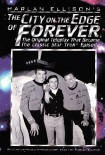
by Harlan Ellison; White Wolf; $16.25
reviewed by John W. Herbert
Perhaps the most famous feud in sf was the decades-long war of words between Star Trek creator Gene Roddenberry and writer Harlan Ellison over “The City on the Edge of Forever,” arguably Trek’s best episode. In this biting polemic, Ellison presents his side of the debate. The Roddenberry line, as presented in numerous interviews and books (many cited in this book), had Ellison refusing to do a rewrite on his script which has Scotty dealing drugs, and would have gone horrendously over budget by hundreds of thousands of dollars to film (the actual amount has risen through the years. Inflation, I guess). Roddenberry rewrites the script, thus saving the episode, and it goes on to win a Nebula and at the ceremony, Ellison pushes aside the recipient to rant about how he was mistreated. (Ellison’s draft goes on to win a Writers’ Guild of America Award.)
Ellison’s teleplay has been reviewed in these pages before (it was previously published in Six Science Fiction Plays), so I won’t dwell on that here – suffice it to say that it is reprinted in its entirety, along with a treatment and revisions. Ellison’s beef is that he has spent the last 30 years listening to what he considers to be Roddenberry’s revisionist history. He claims that he did as many as five rewrites on the script trying to accommodate Roddenberry’s directives. Scotty was never dealing drugs, because Scotty was never in the script. “City” won a Hugo, not a Nebula, and Ellison wonders how Roddenberry saw him push anyone aside since Roddenberry was never at the convention. He also notes that the Roddenberry rewrite, which was done partly to save money, still went $66,000 over budget (and when your budget is $191,000 per episode, that ain’t chicken feed). He also has some surprising evidence that Roddenberry never actually did the rewrite that he would eventually spend years taking credit for.
To say that Ellison is not kind to Roddenberry, is something of an understatement; Ellison is downright malicious. But the mounting evidence since his death that Roddenberry spent his career acting like less like a divine prophet and more like a glory-hogging television producer, makes Ellison’s version of events all the more believable.
No comments:
Post a Comment